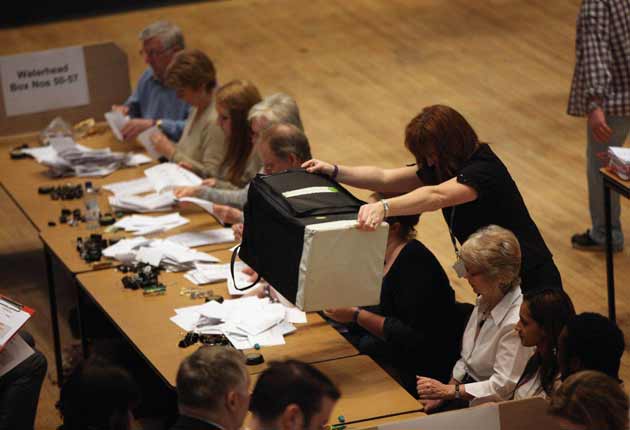David Owen: I support a PR system, but I will be voting ‘no’ in the AV referendum

Your support helps us to tell the story
From reproductive rights to climate change to Big Tech, The Independent is on the ground when the story is developing. Whether it's investigating the financials of Elon Musk's pro-Trump PAC or producing our latest documentary, 'The A Word', which shines a light on the American women fighting for reproductive rights, we know how important it is to parse out the facts from the messaging.
At such a critical moment in US history, we need reporters on the ground. Your donation allows us to keep sending journalists to speak to both sides of the story.
The Independent is trusted by Americans across the entire political spectrum. And unlike many other quality news outlets, we choose not to lock Americans out of our reporting and analysis with paywalls. We believe quality journalism should be available to everyone, paid for by those who can afford it.
Your support makes all the difference.The referendum on AV has, unsurprisingly, generated very limited enthusiasm. People know they are being used as part of a fix between politicians unwilling to trust voters and let them have a free choice between proportional representation as well as AV and the status quo. Fixes happen in Parliament, but they have no place in the referendum.
I have been a long-standing supporter of proportional representation and joined the Electoral Reform Society in 1985, determinedly campaigning for proportional representation for more than two decades. This referendum will not set Britain down the path of real electoral reform; it will replace a bad system with a worse one, and risks putting off the prospect of real reform for generations.
* Gordon Brown had offered the Liberal Democrats a three-way referendum in the coalition negotiations: first past the post, the alternative vote and proportional representation. That is the option Nick Clegg and David Cameron should have put to us in the referendum. Refusing to put proportional reform on the agenda and give the public a real choice is a serious mistake by the Conservative Party and the Liberal Democrats.
* AV is no more than the "miserable little compromise" Nick Clegg described it as. AV does not address the unfairness of the present system. It won't end safe seats, tactical voting or wasted votes. It is a system that none of our partners in the EU use, and it has been rejected by inquiries into electoral reform.
None of these inquiries favoured a system where the second preferences of the least popular candidates have the most influence. Because the first candidate to get eliminated under AV – typically a fringe or extremist candidate – gets their votes redistributed first, they have the best chance of determining the final result. Also, AV can make election results even more disproportional. The Electoral Reform Society described AV as "not suitable for the election of a representative body, eg, a parliament". At the same time, AV does little to make it easier for smaller parties to get into Parliament.
As to the argument that a Yes vote in May will open the door to proportional representation in the future, this is wishful thinking. If AV is installed even on a low vote, it will have to be tested for a substantial period of time since rapid constitutional change destabilises our political system.
* There are two scenarios after a Yes vote. If AV proves popular, there won't be demand for further change. And if it proves unpopular, voters will demand a return to first past the post – as they did in the three Canadian provinces that tried AV then went back to first past the post. Either way, implementing AV would end the reform process.
* I have great sympathy with those who fear a No vote will end the possibility of electoral reform. Obviously, the defeat of AV will not immediately trigger a referendum on PR, but a principled "No to AV, Yes to PR" can keep the door open for real reform. Popular demand for PR won't go away after a No vote; the present fragmentation of support for the major political parties will not end simply because of a No vote.
If AV is opposed only by those who want the status quo and the referendum is defeated, then proportional representation will die, too. I urge you to vote for constitutional change because you believe in it, not for a tactical or questionable long-term advantage. Electoral reformers who vote "No to AV, Yes to PR" will help to establish that it is the best system. Stand firm with the courage of your own convictions.
Lord Owen was the leader of the Social Democratic Party
Join our commenting forum
Join thought-provoking conversations, follow other Independent readers and see their replies
Comments